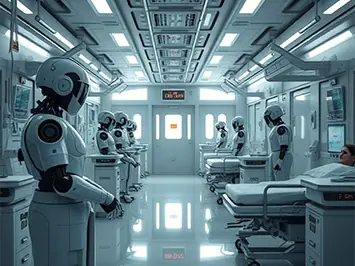
The Future is Now: The Transformative Power of Artificial Intelligence
In an age defined by rapid technological advancement, artificial intelligence (AI) emerges as a key player poised to redefine how we live, work, and interact. As we surge forward into the future, AI’s immense potential to transform industries and improve our daily lives becomes increasingly apparent. From optimizing healthcare and enhancing education to revolutionizing transportation and advancing environmental sustainability, the possibilities seem limitless.
One of the foremost arenas where AI is making a significant impact is healthcare. The rise of predictive analytics, powered by machine learning algorithms, could lead to earlier diagnoses and more personalized treatment plans. AI technologies can analyze vast amounts of data from medical records, wearables, and clinical trials far more quickly and accurately than human doctors. A recent study showed that AI-powered diagnostic tools could outperform radiologists in identifying certain cancers, indicating that these technologies may not only augment human capabilities but also save lives. Moreover, AI’s ability to predict outbreaks of diseases based on global health data could play a crucial role in preventing pandemics, making it an invaluable asset for public health.
Beyond healthcare, AI is reshaping the educational landscape. Personalized learning experiences driven by AI can cater to the individual needs of students, making education more engaging and effective. For instance, AI can assess a student’s strengths and weaknesses and provide tailored learning materials that suit their learning pace. This adaptive approach can help bridge the gap for students who may struggle in traditional learning environments, ultimately promoting educational equity. Furthermore, AI chatbots are already proving their worth as tutoring aids, ensuring that students receive assistance outside of the classroom.
The transportation industry is also witnessing a revolution, largely thanks to AI. Self-driving vehicles are no longer a distant dream but a reality being tested and implemented across the globe. These autonomous systems, powered by advanced AI algorithms, promise to reduce traffic accidents, lower emissions, and ease congestion. With AI managing routes and traffic patterns, not only can travel times be significantly reduced, but the entire urban mobility ecosystem may become more efficient and sustainable. Already, cities are embracing AI-powered public transport systems that optimize schedules and routes based on real-time demand, enhancing the travel experience for commuters.
But transportation and healthcare are just the tip of the iceberg. In the realm of environmental sustainability, AI has the potential to act as a pivotal ally. By analyzing climate data and environmental trends, AI can help scientists develop better models for predicting natural disasters, optimizing resource management, and combating climate change. For instance, AI can optimize energy distribution in smart grids, improving the efficiency of renewable energy sources like solar and wind. In agriculture, AI technologies can monitor crop health and predict yield, allowing farmers to make data-driven decisions that minimize waste and environmental impact. With these insights, not only do we stand a chance to ensure food security, but we can also promote sustainable agricultural practices that are crucial for the planet’s future.
AI is also revolutionizing the workforce by automating mundane tasks and enhancing productivity. By handling repetitive administrative duties, AI frees employees to focus on high-value creative tasks that require human ingenuity. Enhanced by machine learning and natural language processing, AI can assist in everything from customer service to complex data analysis, driving innovation across sectors and creating new job opportunities in AI development and maintenance.
Critics of AI often raise concerns about job displacement and the ethical implications of integrating AI into various aspects of our lives. However, as history has shown, technological advancements often lead to the creation of new jobs and industries. The key lies in adapting our education systems to prepare a workforce that can thrive alongside AI. Emphasizing STEM education and fostering a culture of lifelong learning will be imperative for future generations to navigate the evolving job landscape.
AI is not only a technological marvel but a beacon of hope capable of addressing some of humanity’s most pressing challenges. As we forge ahead into an uncertain future, the integration of AI across multiple sectors holds promise for enhancing our quality of life, fostering sustainable practices, and driving successful economic growth. With thoughtful policies and a proactive approach towards ethical AI development, we can unlock the transformative power of AI, ensuring that its incredible benefits are harnessed for the greater good. As we stand on the precipice of this new frontier, the time to invest in AI is now, for the future depends on our willingness to embrace the extraordinary possibilities that lie ahead.

